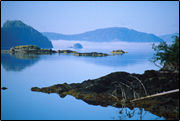The BC Offshore Oil and Gas Moratorium

What ever happened to the burning issue of lifting the decades-old British Columbia offshore oil and gas moratorium? The grapevine has it that Gordon Campbell has been leaning on Stephen Harper to lift the federal ban, but that Ottawa is in no hurry to do so. Meanwhile, Shell Canada head Clive Mather was recently reported to be pushing for resumption of exploration activity. For its part, the public seem to have no desire for offshore activity, and the Queen of the North ferry disaster has only served to highlight the perils of doing anything in these waters. Then there are hurricanes Katrina and Rita, which are said to have destroyed an incredible 113 Gulf of Mexico production platforms, plus 457 pipeline gathering systems. If this isn't a wake up call on the subject of drilling in extreme environments, then what is? I mean, the Gulf was one of those areas cited by proponents of lifting the ban as a success story, with an impeccable safety and environmental record.
Mind you, offshore Newfoundland is another frontier area often mentioned as a model for BC offshore exploration and development. Well, you can forget about that claim now, because just this week Petro Canada was fined a record $290,000 CDN for the 2004 Terra Nova spill. In this case, a test separator malfunctioned for five hours at the floating production, storage and off-loading vessel, which is located 350 kilometres offshore. The result was that a total of approximately 160,000 litres of crude oil spilled into the ocean before crew noticed anything. Unbelievably, the company says that no one has been disciplined for the spill, since it was a team effort. Way to go team! If we stick together it's truly amazing what we can accomplish!
The point in all this is that when operating in extreme environments such as the Gulf of Mexico or offshore Newfoundland, Murphy's law kicks in - anything that can go wrong will go wrong. You can take all the precautions imaginable, and over-engineer everything, but at the end of the day you're still tempting fate by operating in sometimes horrendous conditions, or leaving yourself open to human error. Do we really want to take such a chance in the Queen Charlotte Basin, where marine bombs occur on average seventeen times each winter with little or no warning, and where it would be virtually impossible to clean up a major spill during wintertime? Scientists tell us that the impact of a major spill in the region could be catastrophic and irreversible. Prevailing winter winds could whip the oil ashore, trapping it in the area's many inlets, bays and fjords. Is it worth risking salmon and other stocks for just a marginal gain in the world's reserves of oil and gas? Why not use up proven reserves onshore instead, where the risks are better understood, and it is easier, in theory at least, to contain a spill?
These are just some of the questions one asks oneself as one awaits word as to whether the offshore oil and gas moratorium is about to be lifted. The oilpatch likes to go to the ends of the earth to find and exploit offshore oil and gas, but does it really have to go everywhere? Are there no places that are better left undisturbed? If there are certain frontier areas where we should not defy the gods, the Queen Charlotte Basin would seem to be a prime candidate for inclusion. In other words, leave the Basin alone. Go somewhere else with your seismic work, your drilling rigs, your production platforms, your tankers and your pipelines. Do not defile what some like to call The Galapagos of the North.

0 Comments:
Post a Comment
<< Home